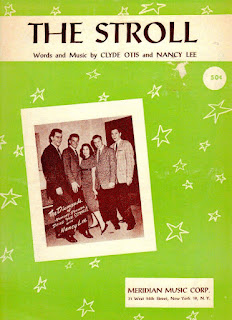Who was Nancy Lee?: Curiously, on the original "Stroll" 45, Clyde Otis shares songwriter credits with the mysterious Nancy Lee. Upon examining the original legal songwriter document for "The Stroll", signed on November 17, 1957 by Meridian Music Corporation and the other parties involved, it reveals that Nancy Lee was seventeen at the time, too young to sign the contract on her own, so her mother co-signed as legal guardian.
It seems strange and unlikely that an established songwriter of the stature of Clyde Otis would team up with an underage, seventeen-year old schoolgirl in the big city of New York and collaborate with her in composing "The Stroll". I asked David Somerville about Nancy Lee and how did she come about co-writing "The Stroll". He said, "You wanna know something? She didn't write a damn thing. The song belonged to Clyde Otis. She was the daughter of one of the executives at the publishing company."
The songwriter share was divided up as follows: 66 2/3% for Clyde Otis who solely wrote the song, and 33 1/3% for Nancy Lee, er, Meridian Music Corporation. But such shenanigans shouldn't really come as a surprise, for they ran rampant within record companies and music publishing firms during the 1950s.
In the case of Nancy Lee, the misfeasance was unabashedly blatant. The sheet music for "The Stroll" featured a photo of Nancy Lee, identified as co-writer, flanked by The Diamonds in Stroll position. The British version featured a similar picture but with Nancy Lee in Stroll action as she is being observed by The Diamonds. But this was an imaginative and cute idea just the same. Most sheet music at the time simply featured a picture of the song artists; seldom were there any action shots.
So, adding injury to insult, Otis was not only excluded from the song's promotional campaign but also had to give up a third of the song's publishing royalties in order to maintain the publisher's ruse that Nancy Lee co-wrote the song. Yet Nancy couldn't even receive the money herself, because she was a minor, so a third of Otis's royalties went to Nancy's mom.






